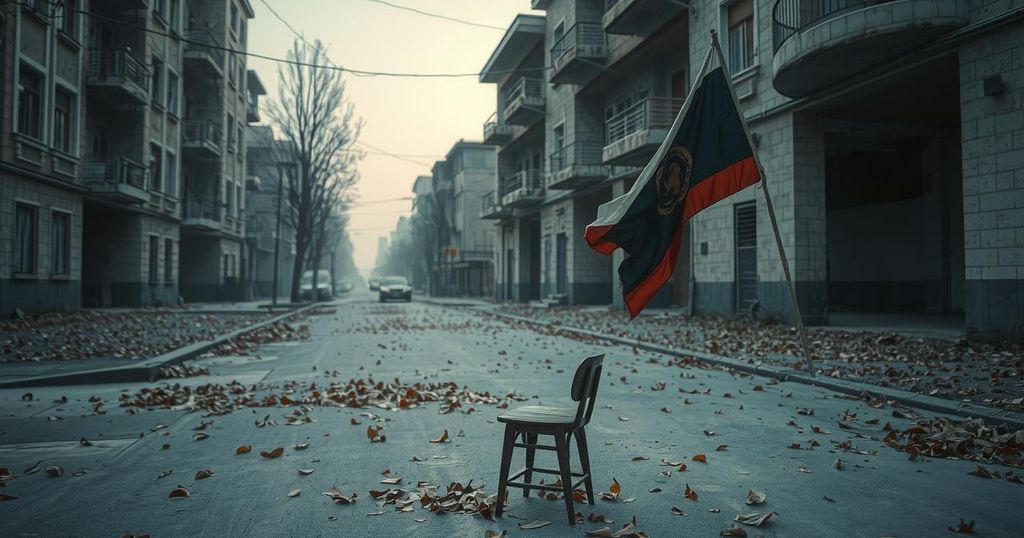The Democratic Republic of Congo is facing a severe insurgency led by the M23 rebel group, resulting in significant civilian displacement and humanitarian crises. The conflict, linked to historic ethnic tensions and regional power dynamics, threatens stability not only in the DRC but in the broader region. International responses have varied, with concerns about the consequences for global mineral supply chains.
The Democratic Republic of Congo (DRC) is currently experiencing a violent insurgency, primarily driven by the rebel group M23, which seeks to expand its territorial control from Goma in the eastern region. This resurgence of conflict, echoing decades of turmoil, has led to significant national and international concern. The ongoing violence has resulted in the displacement of over 400,000 people in just one month, according to United Nations reports, raising fears of a broader regional war.
The Congolese government led by President Félix Tshisekedi has deemed M23’s actions as a “declaration of war” by neighboring Rwanda, amidst reports of corpses in the streets of Goma and the disruption of essential utilities like water and electricity. Tshisekedi has pledged to reclaim all lost territories, reflecting the deep-seated tensions fueled by historical ethnic conflicts in the region.
The conflict’s roots can be traced back to the DRC’s struggle for stability since its independence from Belgium in 1960, and the prolonged warfare from 1996 to 2003 that resulted in millions of civilian casualties. The situation in the DRC, while far removed from the United States, carries significant implications for global mineral supplies, particularly cobalt, crucial for modern technology.
International reactions have been mixed, with Western nations prompted to consider their response amid growing violence. French officials have engaged with Tshisekedi following public outcry for international intervention, while the United States has advised its citizens to evacuate the region as fighting intensifies.
M23 represents a complex interplay of ethnic struggles, being primarily composed of Tutsi individuals who feel marginalized in a Hutu-dominated nation. Historical tensions trace back to the genocide in Rwanda in 1994, leading to refugee migrations that aggravated local conflicts in the DRC.
China, which controls a significant portion of the DRC’s cobalt production, has expressed concern over the conflict’s escalation. The Chinese government’s condemnation of M23’s actions highlights the intricate balance of economic interests and geopolitical dynamics in Central Africa, as insurgent activities disrupt mineral extraction and trade, critical for the global electronics market.
Rwanda’s involvement complicates the situation further. Historically supportive of M23, Rwanda maintains strategic importance in the region, with many Western nations hesitating to confront its actions due to Rwanda’s status as a key partner. Reports suggest that despite sanctions from the international community in the past, the flow of support to Rwanda continues, allowing M23’s offensive to persist without restraint.
The Democratic Republic of Congo (DRC) has a long history of conflict, with the current insurgency led by the M23 group. The country is rich in minerals, including cobalt, which are essential for modern technology. The latest conflicts have escalated, leading to significant humanitarian crises and geopolitical tensions, highlighting the complexities of ethnic relations within the region and the international implications of the ongoing strife. The involvement of regional powers like Rwanda and the economic ambitions of global players such as China illustrate the multifaceted nature of the DRC’s conflicts, making the situation urgent and requiring concerted international attention to restore stability and peace. The DRC’s struggle has not only resulted in an internal humanitarian catastrophe but also poses risks to global supply chains, especially concerning the minerals vital for technology. Therefore, understanding the underlying issues and international responses is crucial in addressing the root causes of the conflict and mitigating its broader impacts.
The ongoing insurgency in the DRC epitomizes a complex conflict driven by historical animosities, geopolitical interests, and economic ambitions surrounding vital mineral resources. While President Tshisekedi’s government mobilizes to confront M23, the international community’s response remains largely subdued. The implications of this crisis extend beyond regional borders, threatening global supply chains and demanding urgent action to prevent further escalation. Continued monitoring and proactive engagement by global powers will be essential in paving the way for peace and stability in this resource-rich nation.
Original Source: www.nbcnews.com




